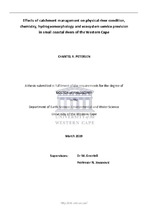| dc.description.abstract | River systems are by nature complex and dynamic systems, which vary in structure and therefore function, and are closely connected to their landscapes. The primary aim of this thesis was to develop a systems operational understanding of how river patterns and processes (geomorphology and hydrology) link to aquatic and riparian systems and biodiversity (ecology) in a framework of evolving land cover/use and management. This illustrated the hydrogeomorphic controls regulating the structure and functioning of rivers in the provision of goods and services that vegetation, especially riparian vegetation, perform as ecological infrastructure, with a focus on the Duiwe River catchment.
This study used a combination of desktop and field analysis. The desktop analysis followed the spatial and temporal historical land use change detection of river sub-catchments to assess the influence on water quality and river flow. It included historical water quality, flow records, rainfall data and aerial photograph time series analysis for trend detection, which were linked to changes in land use activities. The field surveys included cross-section surveys, physical and chemical sediment analysis, vegetation distribution, ground-water depth surveys and instream biological surveys of aquatic bioindicators.
The study illustrated a correlation between land cover/use, water quality and river ecological integrity. When spatial heterogeneity of the catchments was altered by human or natural events, it was reflected by changes in the water quality. The linkages between the land cover/use and ecological integrity were examined using macroinvertebrates and algae. Macroinvertebrates were indicative of habitat integrity and river condition, while the benthic filamentous algae were indicative of increased nutrients and alkalinity. Results indicated that the full consortium of algae and macroinvertebrates be used as bioindicators for ecological integrity assessments in these short, coastal rivers.
The influence of riparian vegetation and its effectiveness in providing regulating (retaining sediment and nutrients) and provisioning (good water quality for humans and the aquatic environment) services was examined by relating contrasting land uses, riparian vegetation, nutrient dynamics and water quality. The land covers generated different runoff volumes, water quality parameter concentrations and associated nutrient loads. Agriculture and alien Acacia mearnsii trees had the greatest impact on nutrient loads. However, a decreasing trend in nutrient concentrations was observed in the cross-section from the pastures to the riparian zones to the river at all sites.
The key findings from this study were formulated into a conceptual framework flow-chain model demonstrating the linkages between river pattern, processes and ecology in the provision of ecosystem services. This interdisciplinary investigation demonstrated strong links between climate, topography, hydrogeomorphology, land cover/use, human activities and their influence on ecological river integrity. The developed framework provides a hierarchical model to link the different disciplines. It illustrates the top-down constraints provided by the system
controllers and habitat drivers, coupled with the anthropogenic impacts as controllers to determine the response of biological entities (riparian vegetation and aquatic biota) at different scales, to ultimately provide ecosystem services. It provides the basis for an understanding of the linkages, processes and interactions that allows, prevents or alters ecosystem service provision by river ecosystems and in the study context, by riparian buffer zones. | en_US |

